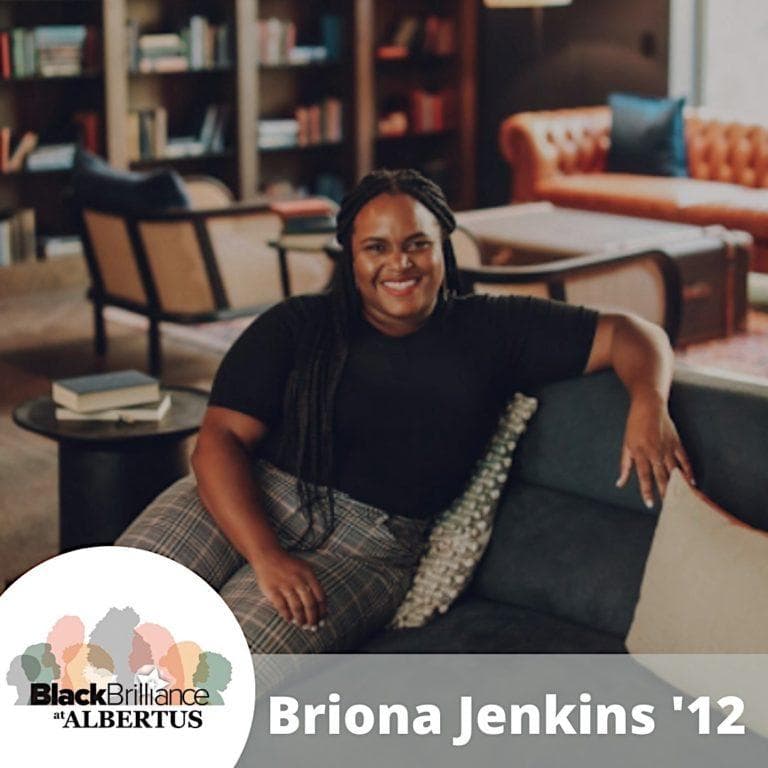As a student at Albertus Magnus College, Briona “Bri” Jenkins (she/her) couldn’t help but get involved in everything. The Hamden native played volleyball, served as a Resident Assistant, Student Orientation Leader, President of the Student Government Association, and still made time to see every Albertus Men’s Basketball, Soccer, and Baseball home game. Her sense of community and drive to achieve would only grow stronger after graduation.
Bri began her undergraduate journey at Albertus as a business major with aspirations of one day owning a restaurant, but that all changed after meeting Dr. Patricia Yeaman and taking her sociology class. Soon, a new dream was born.
“She just changed my mind about what a college professor had to be. She did not take herself super seriously, and she actually cared about what was happening.”
Another sociology professor, Dr. Karen Kendrick, also made a lasting impression on Bri’s passion for improving the lives of others. She was never afraid to have uncomfortable but necessary conversations. Bri recalls that after the killing of 17-year-old Trayvon Martin, Dr. Kendrick required her class to pause and have a discussion.
“She said ‘it’s’ going to be hard, it’s going to be awkward, and we’re going to sit and talk about it.’”
With the influence of faculty like Dr. Yeaman, Dr. Kendrick, and others, along with her upbringing around activists, it’s no surprise that Bri would be driven to change the world. Her Godfather is the pastor of Shiloh Missionary Baptist Church in New Haven, which holds a march every year in honor of Martin Luther King Jr.’s birthday. Bri has been in attendance since she was five years old. Being surrounded by those involved in the Civil Rights Movement taught her how to be unapologetic about every part of her identity: a Woman, a Black Woman, and a Queer-Identifying Person.
Now living in Austin, Texas, Bri has over 8 years of social work experience while serving on a number of boards including Random Acts, Keep Austin Fed, Austin Black Pride, and Lone Star Victims Advocacy Project– just to name a few. She also appears on panels, speaks at rallies, hosts her own podcast, and owns her own consulting business: Briona Jenkins Consulting.
With all of this work Bri puts in every day, she knows where to draw the line and when it’s okay to say ‘no.’ She has advice for other activists experiencing burnout:
Stay organized.
“If it’s not on my calendar, it doesn’t exist.”
Bri schedules everything on her digital calendar, from work meetings to dinner with friends.
Set strong boundaries.
Before you can take care of others, you need to take care of yourself. Bri learned the value of saying no, and that it’s okay to not be the number one person for every event.
“No is a complete sentence. So many people feel like they have to constantly say yes, or show up. I had to learn that it is okay to say no and support in other ways.”
Take your ego out of the work.
Bri emphasizes that activism is about the work, not the image.
“A lot of people think that activism is just glamorized, but there’s a lot of stuff that happens that isn’t shared. Some people think you’re going to get fame and recognition for it. If that’s the reason why you’re in this work, then you can get out now because it’s not going to happen right away.”
Learn to let people support and help you.
Recognizing that she needs to work on this skill herself, Bri has made great strides.
“I am a vehemently independent person. My Mom passed away when I was 15, my Dad and I stopped talking when I was 18, so for more than half of my life, it has just been me depending on me. Now I’m trying to let people in and help me more. Asking for help doesn’t make you weak.”
Unplug.
It can be hard to separate yourself from your phone, but Bri says sometimes it needs to be done in order to reset.
“I will literally put my phone on the charger in the kitchen and go lay down on my bed and just disconnect.”
Her advice for our future Black Alumni who wish to one day own their own business? Know your worth. Recognizing the struggle many young Black People face to over-achieve in order to be considered excellent, brilliant, or successful, she says that validation comes from within.
“You are valid and worthy, and that comes from you and no one else. People don’t need to notice that for it to be true. There are going to be people in this world who just don’t like you because of how you look, and that’s their loss. Walk into a room knowing you deserve to be where you are.”

